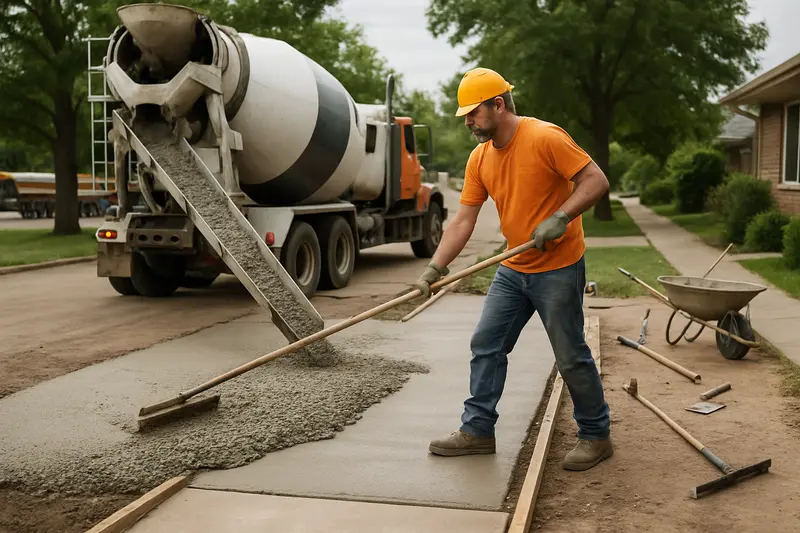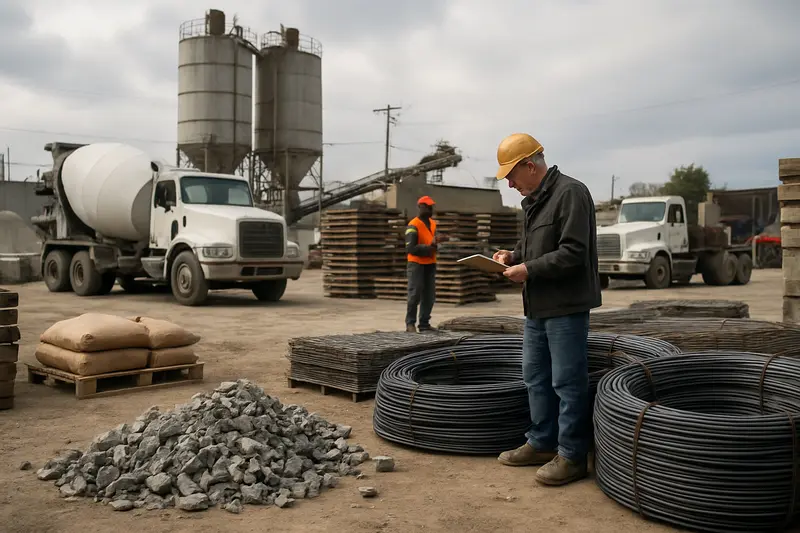
Tariffs Disrupt Concrete Supply Chains: Impacts on Concrete Driveway Contractors
Recent increases in tariffs on imported materials have significantly impacted the concrete industry. Concrete driveway contractors and construction companies face delays and elevated costs due to disrupted supply chains. These challenges threaten project timelines and profit margins, making it crucial for professionals to adapt to evolving market conditions. Understanding the causes, effects, and mitigation strategies associated with tariff-induced disruptions can help contractors maintain competitiveness and deliver quality projects despite ongoing economic pressures.
Supply Chain Disruptions and Material Shortages in Concrete Construction

The bustling concrete supply yard hums with activity, yet beneath the surface, tensions are mounting. Scattered across the yard are bags of cement stacked in haphazard piles, rebar coils curl chaotically beside raw materials, and trucks line up, waiting patiently but with visible impatience. The scene captures an industrial rhythm disrupted by recent import tariffs that have thrown typical supply chains into disarray.
Workers move swiftly among the materials, inspecting deliveries and adjusting storage arrangements. Their faces reveal concern as shipments arrive later than scheduled, and some materials show signs of wear from prolonged storage. The delay in import shipments has become a pressing obstacle—delays caused by heightened tariffs that make importing essential components more expensive and unpredictable. These increased costs ripple through every stage of the supply chain, forcing contractors to reevaluate project timelines.
Truck drivers sit idle, engines idling, as logistical obstacles escalate. Shipping containers sit unopened, waiting for clearance or re-routing around tariff-affected ports. These hurdles extend lead times and inflate costs, creating a ripple effect that hits contractors, homeowners, and project managers alike.
Amid the chaos, workers inspect raw materials more closely, checking for quality despite the strained supply chain. The scarcity of certain imports—like specific grades of cement or specialized rebar—has prompted some contractors to seek alternatives or adjust their designs. However, these options frequently involve additional costs or compromise on specifications, complicating project planning.
This environment underscores how tariffs, often seen as economic policies, directly impact the tangible aspects of construction. They delay project schedules and inflate budgets, making it harder for concrete driveway contractors to meet client expectations. Such disruptions highlight the importance of robust supply chain management and the need for proactive measures to mitigate the unpredictable impact of international trade policies. As delays accumulate and prices rise, contractors are compelled to adapt quickly, reassessing their procurement strategies and exploring local sourcing options whenever possible. For those involved in concrete construction, navigating these logistical obstacles is now a critical element of project management, demanding vigilance and flexibility in a landscape altered by tariffs.
Strategies for Concrete Driveway Contractors to Mitigate Tariff Impact

Facing the challenges of rising import tariffs requires proactive planning and adaptable strategies for concrete driveway contractors. When tariffs cause delays and increase material costs, contractors must reassess their project management approaches to stay profitable and meet client expectations. One effective tactic is early project planning, which involves anticipating supply chain disruptions and allowing extra time for procurement. Shopping around for alternative suppliers—locally or domestically—can reduce dependency on heavily taxed imports and minimize delays.
Maintaining close communication with suppliers is essential. Regular updates about shipment statuses and potential delays help contractors adjust schedules proactively. Additionally, diversifying sources for materials like rebar, cement, and specialized aggregates can prevent over-reliance on specific import channels that may be impacted by tariffs. It’s wise to develop relationships with multiple vendors to gain flexibility.
Cost management remains critical. Contractors should incorporate potential tariff-induced increases into project budgets from the outset. Transparent discussions with clients about possible adjustments prepare all parties for changes in scope or pricing. When facing escalating costs, consider value engineering—finding more affordable solutions without compromising durability or aesthetic quality.
On-site, contractors can review project plans with their teams, exploring ways to optimize material usage and reduce waste. Using advanced project management tools can help identify bottlenecks and facilitate real-time adjustments. For example, scheduling work phases to mitigate waiting times for imported materials can keep projects on track.
Embracing technology is another key element. Digital blueprints, 3D modeling, and mobile collaboration tools enable detailed planning, enabling teams to swiftly adapt to unforeseen issues. Training staff to efficiently incorporate alternative materials or methods can also prevent delays.
Finally, staying informed about ongoing policy changes and participating in industry groups can provide early warnings about tariff updates. Engaging with associations that advocate for fair trade policies might influence future tariff decisions.
By combining strategic planning, supplier diversification, cost controls, and technological adoption, concrete driveway contractors can better weather the storm of import tariffs. These measures not only mitigate immediate disruptions but also strengthen resilience against future supply chain challenges. To further refine your approach, explore how local regulations and innovative construction techniques can complement these strategies during uncertain times. For instance, concrete repair specialists often benefit from adopting adaptable techniques to manage fluctuating material costs and project timelines. Learn more about these approaches at https://concretecontractorshouston.com/.
Final words
The impact of tariffs on imported materials presents ongoing challenges for concrete construction, especially for driveway contractors. While supply chain delays and costs increase are inevitable, proactive planning and supplier diversification can help mitigate risks. Staying informed about market developments and adopting flexible strategies are vital for maintaining project timelines and profitability. Contractors who adapt quickly will be better positioned to navigate these economic obstacles and continue delivering quality concrete services.
Find the Best Concrete Contractors in Houston
Learn more: https://concretecontractorshouston.com/contact/
About us
Join the Featured Listings on Concrete Contractors Houston and put your business in front of homeowners, builders, and businesses actively searching for concrete experts like you. As a Featured Contractor, your listing appears at the top of our directory—guaranteeing maximum visibility and making you the first choice in your service area.
